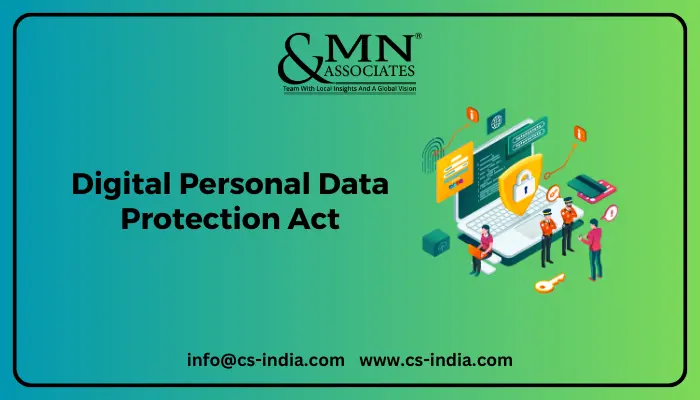
An Overview of India’s Digital Personal Data Protection Act, 2023
In the recent past, India took a significant stride in safeguarding digital privacy with the enactment of the Digital Personal Data Protection Act (DPDPA). Crafted to ensure the fair, transparent, and secure processing of personal data, this comprehensive legislation marks a pivotal moment in India’s legal landscape. MN & Associates, with its expertise in navigating the intricacies of business laws, recognizes the profound implications of the DPDPA for organizations across the country.
Understanding the Digital Personal Data Protection Act DPDPA
At its core, the DPDPA serves to protect the data rights of Indian citizens while acknowledging the imperative of data processing for legitimate purposes. This regulatory framework governs the collection, storage, use, and transfer of personal data, imposing stringent obligations on organizations that handle such data. It is imperative for businesses to grasp the nuances of this law to ensure full compliance and mitigate potential legal and financial risks.
Effective Implementation
While the Digital Personal Data Protection Act (DPDPA) was officially announced on August 11, 2023, its enforcement awaits the declaration of an effective date by the government. The varied effective dates for different provisions further underscore the need for organizations to remain vigilant and prepared for compliance. It is anticipated that the effective date will be determined following a period of transition, during which organizations can prepare and adapt their processes to align with the requirements of the DPDPA.
Key Principles and Procedures
The DPDPA enshrines crucial principles such as obtaining consent, limiting data usage, ensuring accuracy and security, and fostering accountability. These principles serve as the foundation for organizations to establish robust data protection practices. Businesses need to develop comprehensive policies and procedures to adhere to these principles effectively. This may involve conducting data protection impact assessments, implementing security measures such as encryption and access controls, and establishing mechanisms for obtaining and managing consent from data subjects.
Additionally, the DPDPA grants individuals rights including access, correction, erasure of personal information, and mechanisms for grievance redressal. Compliance entails establishing robust data lifecycle management policies, prioritizing data deletion post-purpose or upon consent withdrawal, and appointing representatives where necessary. Organizations must also ensure that they have processes in place to facilitate the exercise of these rights by data subjects, including responding promptly to requests for access or correction of personal data.
Objectives and Exemptions
In an era dominated by digital transactions and interactions, the DPDPA strives to empower individuals with control over their personal data while facilitating its lawful processing. However, certain exemptions exist, particularly concerning objectives related to sovereignty, state security, and public order as outlined in Section 17(2) of the Act. While these exemptions recognize the legitimate interests of the state in certain circumstances, organizations must still ensure that any processing of personal data exempted under these provisions complies with the overarching principles of the DPDPA, including obtaining consent where required and ensuring the security and accuracy of the data.
Section 9 and Its Implications
Section 9 of the Digital Personal Data Protection Act (DPDPA) mandates data fiduciaries to obtain verifiable consent from parents or lawful guardians before processing the personal data of minors or individuals with disabilities. This provision underscores the Act’s commitment to protecting vulnerable groups in the digital sphere. Organizations must ensure that they have mechanisms in place to obtain consent in a manner that is accessible to individuals with disabilities and that respects the rights of minors. This may involve providing clear and concise information about the purposes of data processing, using accessible formats for obtaining consent, and providing mechanisms for individuals to withdraw consent at any time.
Benefits and Consequences
The DPDPA heralds a new era of data privacy in India, instilling confidence among users by mandating accuracy, security, and timely deletion of personal data. Empowering individuals with rights and avenues for grievance redressal, it fosters accountability and transparency in data processing. However, non-compliance carries significant penalties, highlighting the importance of adherence to the Act’s provisions. Organizations that fail to comply with the DPDPA may face fines of up to INR 250 crore for serious violations, as well as reputational damage and loss of trust among customers and stakeholders.
Looking Ahead
As technology continues to advance, prioritizing data protection is paramount. India’s commitment to establishing a robust data privacy framework underscores its dedication to safeguarding personal information. For businesses, developing strong privacy governance programs is essential not only for risk mitigation but also for building transparent and sustainable operations in the digital age. By investing in data protection measures and ensuring compliance with the DPDPA, organizations can enhance trust and confidence among customers, protect their reputations, and mitigate the risk of costly penalties and legal action.
In conclusion, the Digital Personal Data Protection Act, of 2023, represents a landmark development in India’s efforts to protect digital privacy rights. As organizations navigate the complexities of compliance, MN & Associates remains committed to providing expert guidance and support in mastering the intricacies of this transformative legislation. Together, we can embrace the opportunities of the digital age while safeguarding the fundamental right to privacy for all.
Need more clarity in any of the aspects?
We are just an email away info@cs-india.com
